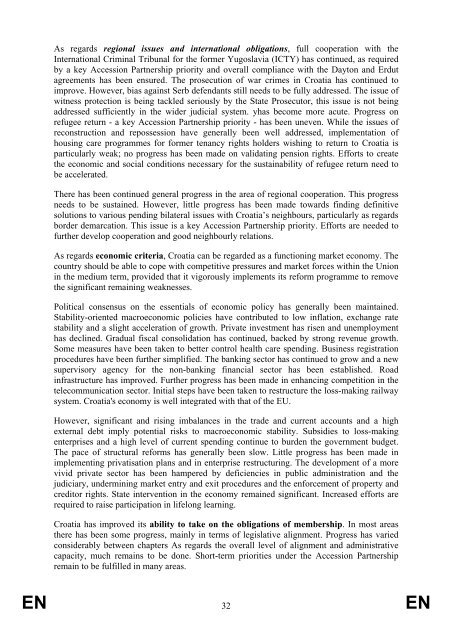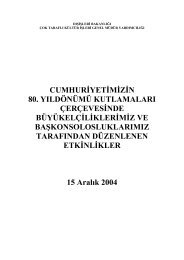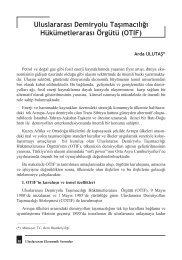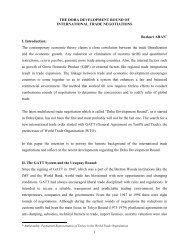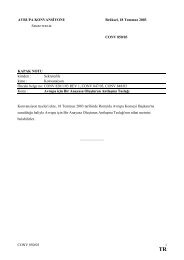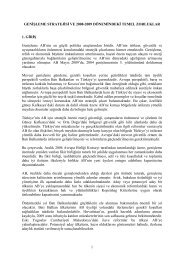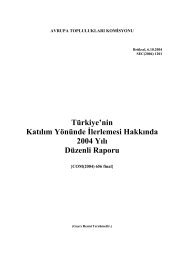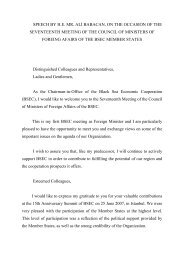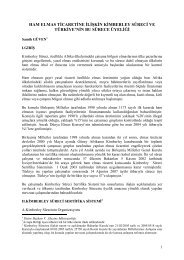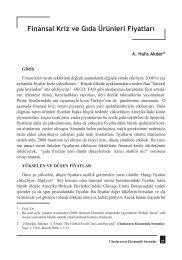Enlargement Strategy and Main Challenges 2006 - 2007
Enlargement Strategy and Main Challenges 2006 - 2007
Enlargement Strategy and Main Challenges 2006 - 2007
You also want an ePaper? Increase the reach of your titles
YUMPU automatically turns print PDFs into web optimized ePapers that Google loves.
As regards regional issues <strong>and</strong> international obligations, full cooperation with the<br />
International Criminal Tribunal for the former Yugoslavia (ICTY) has continued, as required<br />
by a key Accession Partnership priority <strong>and</strong> overall compliance with the Dayton <strong>and</strong> Erdut<br />
agreements has been ensured. The prosecution of war crimes in Croatia has continued to<br />
improve. However, bias against Serb defendants still needs to be fully addressed. The issue of<br />
witness protection is being tackled seriously by the State Prosecutor, this issue is not being<br />
addressed sufficiently in the wider judicial system. yhas become more acute. Progress on<br />
refugee return - a key Accession Partnership priority - has been uneven. While the issues of<br />
reconstruction <strong>and</strong> repossession have generally been well addressed, implementation of<br />
housing care programmes for former tenancy rights holders wishing to return to Croatia is<br />
particularly weak; no progress has been made on validating pension rights. Efforts to create<br />
the economic <strong>and</strong> social conditions necessary for the sustainability of refugee return need to<br />
be accelerated.<br />
There has been continued general progress in the area of regional cooperation. This progress<br />
needs to be sustained. However, little progress has been made towards finding definitive<br />
solutions to various pending bilateral issues with Croatia’s neighbours, particularly as regards<br />
border demarcation. This issue is a key Accession Partnership priority. Efforts are needed to<br />
further develop cooperation <strong>and</strong> good neighbourly relations.<br />
As regards economic criteria, Croatia can be regarded as a functioning market economy. The<br />
country should be able to cope with competitive pressures <strong>and</strong> market forces within the Union<br />
in the medium term, provided that it vigorously implements its reform programme to remove<br />
the significant remaining weaknesses.<br />
Political consensus on the essentials of economic policy has generally been maintained.<br />
Stability-oriented macroeconomic policies have contributed to low inflation, exchange rate<br />
stability <strong>and</strong> a slight acceleration of growth. Private investment has risen <strong>and</strong> unemployment<br />
has declined. Gradual fiscal consolidation has continued, backed by strong revenue growth.<br />
Some measures have been taken to better control health care spending. Business registration<br />
procedures have been further simplified. The banking sector has continued to grow <strong>and</strong> a new<br />
supervisory agency for the non-banking financial sector has been established. Road<br />
infrastructure has improved. Further progress has been made in enhancing competition in the<br />
telecommunication sector. Initial steps have been taken to restructure the loss-making railway<br />
system. Croatia's economy is well integrated with that of the EU.<br />
However, significant <strong>and</strong> rising imbalances in the trade <strong>and</strong> current accounts <strong>and</strong> a high<br />
external debt imply potential risks to macroeconomic stability. Subsidies to loss-making<br />
enterprises <strong>and</strong> a high level of current spending continue to burden the government budget.<br />
The pace of structural reforms has generally been slow. Little progress has been made in<br />
implementing privatisation plans <strong>and</strong> in enterprise restructuring. The development of a more<br />
vivid private sector has been hampered by deficiencies in public administration <strong>and</strong> the<br />
judiciary, undermining market entry <strong>and</strong> exit procedures <strong>and</strong> the enforcement of property <strong>and</strong><br />
creditor rights. State intervention in the economy remained significant. Increased efforts are<br />
required to raise participation in lifelong learning.<br />
Croatia has improved its ability to take on the obligations of membership. In most areas<br />
there has been some progress, mainly in terms of legislative alignment. Progress has varied<br />
considerably between chapters As regards the overall level of alignment <strong>and</strong> administrative<br />
capacity, much remains to be done. Short-term priorities under the Accession Partnership<br />
remain to be fulfilled in many areas.<br />
EN 32 EN


